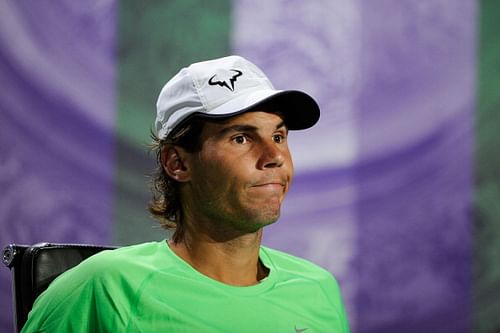
Nadal under pressure to put Wimbledon out to grass

Rafael Nadal of Spain reacts as he speaks to members of the media during a press conference following his defeat to Steve Darcis of Belgium in their Gentlemen’s Singles first round match on day one of the Wimbledon Lawn Tennis Championships at the All England Lawn Tennis and Croquet Club on June 24, 2013 in London, England. (Photo by Thomas Lovelock/AELTC – Pool/Getty Images)
Rafael Nadal came under pressure on Tuesday to turn his back on Wimbledon if he wants to extend his career and preserve his reputation as one of the sport’s greatest and most-feared competitors.
The Spaniard suffered his first ever loss in the opening round of a Grand Slam when he slumped to a straight sets defeat to Belgium’s world number 135 Steve Darcis.
It was another twist in the 27-year-old’s bittersweet relationship with the tournament, where he has been champion twice but also now endured back-to-back humiliating losses.
Twelve months ago, he was defeated in the second round by Czech number 100 Lukas Rosol, a shocker which forced him to take a seven-month break from the tour to rest his increasingly unreliable knees.
“He definitely has to consider whether grass has a future for him,” three-time Wimbledon champion Boris Becker told the BBC.
“I almost thought that he should contemplate not playing this year.”
Nadal arrived at Wimbledon having wrapped up a record eighth French Open title.
That was his seventh trophy in nine finals since his return to the tour in February, a run which had also seen him rack up 43 wins in 45 matches.
But eight of those tournaments came on his favourite clay surface, where his knees are not subject to the same crippling pressures.
On grass he needs to bend lower and crouch for the ball while also needing to jam the brakes on his relentless scrapping, jarring the joints even further.
The warning signs were already there in the aftermath of his record win in Paris when he admitted he was concerned over how the knees would hold up at Wimbledon.
The 12-time Grand Slam title winner immediately withdrew from the Halle grasscourt warm-up in Germany and on Monday Nadal, with white taping again supporting his left knee, was seen to visibly wince with pain.
“Grass is very different compared to the other surfaces. Your movement is different and you have to have healthy legs because you’re changing direction, you’re slipping and sliding,” added Becker.
“If you have a knee problem, grass is the worst surface. Hard courts are not as bad because you have a firm position, you can put your foot down and stand up to hit the ball — the bounce is higher so you don’t have to bend as low.
“I wouldn’t worry about Nadal playing on hard courts or indoors but I always thought grass was an issue.”
Nadal had played 35 Grand Slams coming into Wimbledon this year without ever having lost in the first round.
But the tournament, part of just a four-week grasscourt season, has always asked the most searching questions of the world number five.
He did not play in 2003 or in 2009 when more knee trouble, which had contributed to his only career loss in Paris, forced him to tearfully give up on the defence of a title he had won for the first time in 2008.
Furthermore, his defeat to Rosol meant he missed the Olympics, the US and Australian Opens.
Nadal refused to blame his knee for his defeat or even discuss the make-up of his schedule for the rest of the year.
“This is sport, it’s not a tragedy,” he said. “Today is not the day to talk about these kind of things. I am confident that I will have a good recovery and be ready for the next tournaments.
“I know the grass is a difficult surface for the way that I need to play. It was not possible this year. But I am gonna try my best for the next couple of years.”
Andy Murray, who could have met Nadal in the semi-finals, insists that the Spaniard will be back to his best.
“I’m sure there will be people writing Rafa off left, right and centre because he lost in the first round but that happens sometimes. He’ll be back,” Murray told the BBC.
“I’ve no idea how bad his knee is and whether it affected him. But players get injured a lot and you often have niggles that you have to deal with.
“Sometimes they make no difference to how you play, sometimes they make a big difference but the thing with injuries is that if you say something about it afterwards, you’re called a sore loser.
“The fact is everybody’s got used to the top guys dominating at the end of Grand Slams and that can’t go on forever.”